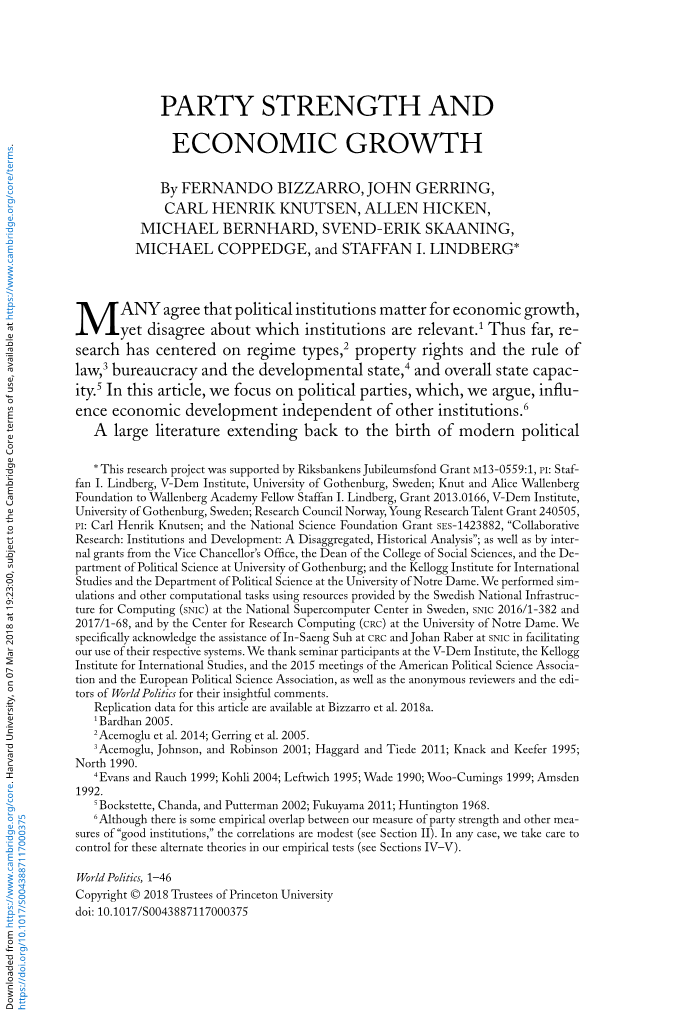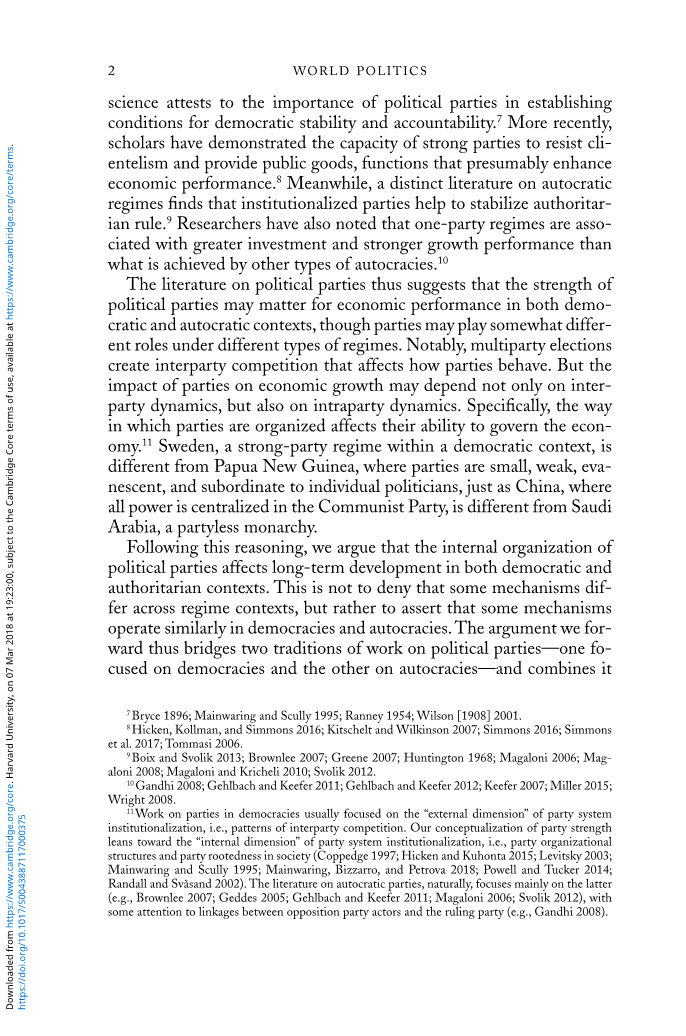

英语原文共 46 页
Party strength and Economic Growth
政党力量(实力)与经济增长
By FERNANDO BIZZARRO, JOHN GERRING, CARL HENRIK KNUTSEN, ALLEN HICKEN, MICHAEL BERNHARD, SVEND-ERIK SKAANING, MICHAEL COPPEDGE, and STAFFAN I. LINDBERG*
费尔南多·比扎罗、约翰·格林、卡尔·亨里克·克努森、艾伦·希肯、迈克尔·伯恩哈德、斯文德-埃里克·斯卡宁、迈克尔·科佩奇和斯塔凡·林德伯格
Many agree that political institutions matter for economic growth, yet disagree about which institutions are relevant.1 Thus far, research has centered on regime types,2 property rights and the rule of law,3 bureaucracy and the developmental state,4 and overall state capacity.5 In this article, we focus on political parties, which, we argue, influence economic development independent of other institutions.
许多人认为政治制度对经济增长至关重要,但对于哪些制度与经济增长相关却存在分歧。到目前为止,研究集中在制度类型、产权和法治、官僚主义和发展国家以及国家整体能力。在本文中,我们关注的是政党,我们认为政党独立于其他机构影响经济发展。
A large literature extending back to the birth of modern political science attests to the importance of political parties in establishing conditions for democratic stability and accountability.7 More recently, scholars have demonstrated the capacity of strong parties to resist clientelism and provide public goods, functions that presumably enhance economic performance.8 Meanwhile, a distinct literature on autocratic regimes finds that institutionalized parties help to stabilize authoritarian rule.9 Researchers have also noted that one-party regimes are associated with greater investment and stronger growth performance than what is achieved by other types of autocracies
大量文献可以追溯到现代政治学的诞生,证明了政党在为民主稳定和问责制创造条件方面的重要性。最近,学者们展示了强大的政党抵抗裙带关系和提供公共产品的能力,这些功能可能会提高经济绩效。与此同时,关于专制政权的独特文献发现,制度化的政党有助于稳定专制统治。研究人员还指出,与其他类型的专制政体相比,一党专政与更大的投资和更强劲的增长表现有关。
The literature on political parties thus suggests that the strength of political parties may matter for economic performance in both democratic and autocratic contexts, though parties may play somewhat different roles under different types of regimes. Notably, multiparty elections create interparty competition that affects how parties behave. But the impact of parties on economic growth may depend not only on interparty dynamics, but also on intraparty dynamics. Specifically, the way in which parties are organized affects their ability to govern the economy.11 Sweden, a strong-party regime within a democratic context, is different from Papua New Guinea, where parties are small, weak, evanescent, and subordinate to individual politicians, just as China, where all power is centralized in the Communist Party, is different from Saudi Arabia, a partyless monarchy.
因此,有关政党的文献表明,政党实力可能对民主和专制环境下的经济表现产生影响,尽管政党在不同的政体下可能扮演不同的角色。值得注意的是,多党选举产生了政党间的竞争,影响了政党的行为。但政党对经济增长的影响不仅取决于政党间的动态,还取决于党内动态。具体来说,政党组织的方式会影响他们管理经济的能力。瑞典是一个民主背景下的强有力的政党政权,它与巴布亚新几内亚不同,巴布亚新几内亚的政党规模小、实力弱、日渐式微,隶属于个别政客,就像中国一样,所有权力都集中在共产党手中;与沙特阿拉伯也不同,一个无党派的君主制国家。
7thinsp;Bryce 1896; Mainwaring and Scully 1995; Ranney 1954; Wilson [1908] 2001.
8thinsp;Hicken, Kollman, and Simmons 2016; Kitschelt and Wilkinson 2007; Simmons 2016; Simmons et al. 2017; Tommasi 2006.
9thinsp;Boix and Svolik 2013; Brownlee 2007; Greene 2007; Huntington 1968; Magaloni 2006; Mag-aloni 2008; Magaloni and Kricheli 2010; Svolik 2012.
10thinsp;Gandhi 2008; Gehlbach and Keefer 2011; Gehlbach and Keefer 2012; Keefer 2007; Miller 2015; Wright 2008.
11thinsp;Work on parties in democracies usually focused on the “external dimension” of party system institutionalization, i.e., patterns of interparty competition. Our conceptualization of party strength leans toward the “internal dimension” of party system institutionalization, i.e., party organizational structures and party rootedness in society (Coppedge 1997; Hicken and Kuhonta 2015; Levitsky 2003; Mainwaring and Scully 1995; Mainwaring, Bizzarro, and Petrova 2018; Powell and Tucker 2014; Randall and Svaring;sand 2002). The literature on autocratic parties, naturally, focuses mainly on the latter (e.g., Brownlee 2007; Geddes 2005; Gehlbach and Keefer 2011; Magaloni 2006; Svolik 2012), with some attention to linkages between opposition party actors and the ruling party (e.g., Gandhi 2008).
关于民主国家政党的研究通常集中于政党制度制度化的“外部层面”,例如,党内竞争模式。我们对政党实力的概念化倾向于政党体系制度化的“内在维度”,即党的组织结构和党在社会的扎根。(1997年);Hicken和Kuhonta 2015;Levitsky 2003;Mainwaring和Scully 1995; Mainwaring, Bizzarro, Petrova 2018;鲍威尔和塔克 2014年;Randall和svas2002. 关于专制政党的文献自然主要关注后者(例如,2007年的布朗利;戈德斯2005;Gehlbach 和 Keefer 2011; Magaloni 2006; Svolik 2012), 并注意反对党参与者与执政党之间的联系(例如,甘地2008)。
Following this reasoning, we argue that the internal organization of political parties affects long-term development in both democratic and authoritarian contexts. This is not to deny that some mechanisms differ across regime contexts, but rather to assert that some mechanisms operate similarly in democracies and autocracies. The argument we forward thus bridges two traditions of work on political parties—one focused on democracies and the other on autocracies—and combines it with important insights from previous work on institutions and development. Our theory thus integrates diverse strands from multiple literatures to make a cohesive case for the role of political parties in economic development. 据这一推理,我们认为,政党的内部组织影响民主和威权两种情况下的长期发展。这并不是否认某些机制在不同政体背景下存在差异,而是断言某些机制在民主政体和专制政体中运作类似。因此,我们提出的论点将两种研究政治党派的传统——一种侧重于民主,另一种侧重于专制——与以往研究机构和发展的重要观点相结合。因此,我们的理论整合了多元文献的不同分支,为政党在经济发展中的作用提供了一个有力的案例。
Before continuing, we offer two important caveats. First, our argument does not presuppose that other institutional features are inconsequential. Growth is a complex outcome in which many institutional and noninstitutional factors presuma


